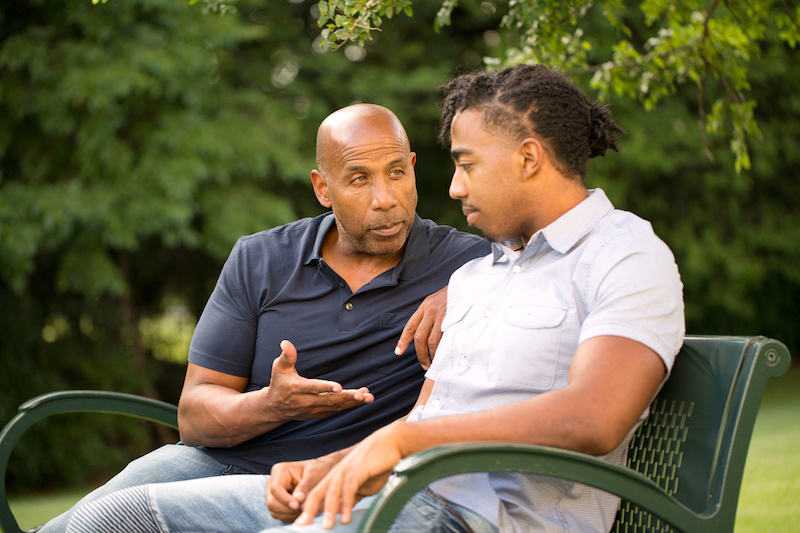This Pandemic is a Good Time to Face Your Social Anxiety

Are you secretly relieved that social distancing is giving you a built-in excuse? Few social demands, fewer social gatherings, canceled group activities?
Remember how you used to feel when you were invited somewhere? All kinds of things went through your head as your discomfort grew:
How many people will be there?
I prefer one-on-one.
I’d rather be alone.
I don’t like being in a group.
I don’t want to go.
3 Different Things That Cause Anxiety and Their 3 Different Solutions

Maryann was raised by a mother who was both emotionally intense and needy. All through her childhood, Maryann had to be very caring and supportive toward her mother to try to prevent explosions.
Because of this, Maryann grew up with strong tendencies to care for and placate others deeply entrenched in her character. But these character traits, essential survival mechanisms growing up, became a serious problem for her in her adult life. Maryann was such a placater that she wasn’t taken seriously at work. Others often took advantage of her. Maryann was not happy.
Finally, Maryann decided that she needed to change. She decided to stop placating, stop agreeing with everyone and everything, and begin to show more backbone. But it wasn’t easy. Each time Maryann tried to speak up for herself to express disagreement or assert her own needs, she felt intense anxiety come over her.
Essentially everyone knows first-hand what it means to be anxious. Few among us are spared this intense feeling of discomfort.
William James, who is considered The Father of American Psychology, described his own anxiety this way: “a horrible dread at the pit of my stomach … a sense of the insecurity of life.”
Since anxiety is so common and troublesome, I’ve seen plenty of it in my work as a psychologist. One thing I’ve noticed is that all anxiety is not the same. The particular type of anxiety you have determines not only how it feels, but also how it should be treated and managed.
3 Causes of Anxiety
1. Biology: Research has shown that some babies are born with an anxious temperament. Babies who are observed as edgy and reactive have been seen to grow up to be edgy and reactive adults; in other words, anxious babies grow into anxious adults. This type of anxiety is genetic, and it tends to run in families.
Biology, however, is not a sentence to a lifetime of anxiety. First, because biological anxiety waxes and wanes throughout your lifetime, it may become problematic really only during times of transition or stress. And second, because you can learn to manage your biological anxiety.
Best Solution: Anxiety management techniques are plentiful and effective. The best way to learn them is to see a cognitive/behavioral therapist. Some common anti-depressant medications are also effective in treating biological anxiety.
2. Childhood Emotional Neglect: This essentially boils down to how you handle your feelings. When you push your emotions down or suppress them, they don’t simply disappear. Instead, they remain there, buried. Repressed and suppressed feelings pool together under the surface and become a diffuse form of anxiety. This type of anxiety seems to come and go at will. It becomes your main feeling. In general, you may find yourself existing in two states: you either feel anxious, or you feel nothing at all.
Best Solution: The best solution for this type of anxiety is to break through the wall between yourself and your pool of blocked-off emotions. Pay attention to your feelings, allow yourself to feel them, learn to put them into words, and how to manage and express them. This may sound like a lot of work, but it will gradually reduce your anxiety and will have multiple other positive effects upon your life satisfaction as well.
3. Personal Growth: This is one of the most powerful, and yet least talked about, forms of anxiety. It’s the anxiety that’s naturally built into virtually every step of emotional or psychological growth that you take in your lifetime. It’s especially intense when you’re trying to give up a coping mechanism that you needed in childhood (like Maryann). This anxiety arises when you’re about to make a healthy change in yourself, and it tries to pull you backward.
Each time Maryann tries to abandon the habit that saved her life in childhood, her body screams, “No-o-o-o-o!” It does this by sending her feelings of fear, to alert her that what she’s about to do is dangerous.
Best Solution: The most helpful strategy in managing this type of anxiety is simply recognizing what it is. When you can accept that it’s only your body warning you against something that’s not dangerous, you can accept the feeling, and then override it. In Maryann’s situation, a vital step in her growth process involves not giving in to the wave of anxiety she feels, but instead letting it wash over her like a wave; and then overriding it. This means speaking up in spite of it.
Each time Maryann manages her anxiety this way, ending with healthy action, she is reducing her anxiety’s power. She’s essentially re-programming her brain to recognize that the new behavior (speaking up) is not dangerous, but adaptive and healthy.
Every single human being, every single day receives messages from their body.
“Escape!”
“Stop!”
“Stay quiet!”
“Don’t try that,” insist the voices of your anxiety.
So now, you must begin to insist back: “I will not run away from this. I will not stop. I will not stay quiet, I will speak up. I will try that.”
Accept the feeling, understand its cause, and you can take control of what’s been controlling you.
To find out if you grew up with Childhood Emotional Neglect Take The Emotional Neglect Test. It’s free. To learn more about how to understand, manage, and override your emotions, see the book, Running on Empty.
A version of this article was originally published on psychcentral.com. It has been updated and republished here with the permission of the author and Psychcentral.
The Difference Between Self-Esteem, Self-Worth, Self-Confidence and Self-Knowledge

I have noticed that there is a great deal of confusion between the four common challenges listed in the title. Sometimes people ask me if they are all the same.
The differences can be subtle and there can be overlap, yes. But they are all indeed different in some very specific ways. Ways that are important to understand as you think about your own view of, and feelings about, yourself.
So let’s start with a little “quiz.” As you read the descriptions below, see if you can identify which person has low self-esteem, which has low self-worth, who has low self-confidence, and who has low self-awareness.
Then read on to see if you identified them correctly, and also to learn much more about each of these common struggles.
Jenny
Jenny sits on the couch in the lobby waiting to be called for her job interview to begin. On the outside, she appears calm and composed. On the inside, she is desperately trying to manage her anxiety and stop the thoughts that are racing through her head.
What if I say the wrong thing? What if they see right through me? I might blow this. I don’t belong here. Around and around those thoughts go, feeding her anxiety.
Dwight
Dwight wakes up at 11:00 this Saturday morning. Lying in bed, he thinks about going straight to the gym to make sure he gets in a workout today. But a dark feeling creeps over him, and he realizes he has already lost this battle. He rolls over and goes back to sleep, wanting to escape this crappy feeling.
Molly
Molly sits with her friends at a restaurant as they all discuss the win/loss record of the Red Sox and whether they are likely to do well this year. As her friends throw around game stats, players’ names and batting averages, she quietly feels mortified. “I can’t even remember the players’ names, much less all these stats. They are all so much smarter than I am.”
Andy
Andy, receiving his 6-month evaluation at his new job, hears his boss say the words, “Your skills with Excel spreadsheets could use some improvement. I’m sending you to an Excel training next week.” His head reeling, he misses the rest of the feedback he receives. He is thinking, “I might as well quit now. This is obviously not the right job for me.”
Now that you have read the experience of Jenny, Dwight, Molly, and Andy above, let’s see how accurately you were able to identify the dilemma of each.
Self-Confidence — Jenny
Jenny’s anxiety is not actually about the job interview. It is about herself. Deep down, Jenny does not believe that she has the ability to present herself well in the interview. She is doubting her own ability and skills. Self-confidence is how much you truly believe in yourself and what you can do.
Self-Worth — Dwight
Dwight knows that he should go to the gym, and he also wants to do so. Surprisingly, that dark feeling that creeps over him is not depression or sadness or grief. It is actually a deep feeling that he is not worth the time, effort and energy that would be necessary to get to the gym. Self-worth is your deeply held feeling about your own value as a person.
Self-Esteem — Molly
Molly feels inferior to her friends as they talk about the facts and statistics of baseball. This is an expression of her low self-esteem. Molly has no idea that she is every bit as intelligent and interesting as the people at the table; she simply knows less about baseball because she is not a fan of the sport. Self-esteem is the way you feel about yourself in different areas, like intelligence, personality, appearance, and success.
Self-Knowledge — Andy
Andy was given lots of good feedback in his evaluation, but he was knocked off his game by the one, small, negative comment he heard. Andy was very hurt by the one small negative statement because he does not know what his strengths and weaknesses are. He doesn’t realize that he brings multiple other strengths to this job that outweigh his lack of experience with Excel. Self-knowledge is how well you know your own abilities, talents, capabilities, preferences, likes and dislikes, wants and needs.
The Ways These 4 Struggles Hold You Back
- Self-Confidence: Having low self-confidence like Jenny makes it hard to try new things or reach for new challenges. Anxiety is a natural result that holds you back, clinging to the familiar things you do have confidence about, like a job, relationship or living situation, for example.
- Self-Worth: Low self-worth undermines what you are willing to do for yourself. Are you worthy of another person’s attention and love? Are you deserving of receiving good things? Do you have enough to offer other people so that they might value you? Having low self-worth prevents you from believing in yourself and from claiming what is yours.
- Self-Esteem: When you have low self-esteem you walk through the world in a one-down position. You operate from a place of, “I’m not good enough.” Everything that happens in your life is filtered through that deeply held notion, even though it is definitely not true. So even mundane interactions like Molly’s, once they go through your filter, can end up hurting you.
- Self-Knowledge: How well, and how accurately, do you see yourself? Can you predict how you will act, or how you will feel, in certain situations? Are you aware of your own strengths and preferences? Low self-knowledge makes it hard to make good choices for yourself, and hard to believe in the decisions you make.
The Underlying Cause
In my work as a therapist for over 20 years I have clearly seen the main factor that prevents good, strong people from seeing, believing, and owning what is so good and strong about them. It is this:
Childhood Emotional Neglect (CEN): Being raised by parents who fail to see, value, and validate your deepest, truest self — your emotions — enough.
When your parents don’t see your feelings, even if it’s not done maliciously, they fail to see the real you. If they don’t see you, they can’t really know you. If they don’t know you, their love won’t feel deep and real.
I have seen over and over again three very relevant things. First, most people who grew up with Childhood Emotional Neglect have no idea that it happened to them. Second, most of those people continue the neglect by emotionally neglecting themselves. And third, if you don’t see and nurture yourself emotionally, you are very vulnerable to low self-confidence, esteem, worth, and knowledge.
The Answer
Yes, believe it or not, there is one! Now that you are aware of what might be wrong, you are on the path to healing it. By learning to treat your feelings and yourself differently you can change how you feel about yourself in very profound ways. This is the path to healing your Childhood Emotional Neglect.
To learn much more about how Childhood Emotional Neglect happens, why you may not be aware of it, and how to reverse it, see the book Running On Empty: Overcome Your Childhood Emotional Neglect.
To find out if you grew up with Emotional Neglect Take the Emotional Neglect Test. It’s free.
To learn how to heal your adult relationships from Emotional Neglect see the book Running On Empty No More: Transform Your Relationships.
Shame: The Most Useless Emotion By Far

If you are like most people, you probably do not think of your emotions as useful at all. Except, perhaps, the happy ones that make you feel good.
But what about all the others? Such as hurt, frustration, anxiety, apprehension, sadness or anger, for example?
Thanks to research in the fields of psychology and neuroscience, we now know that we are born biologically wired with emotions for a reason. In fact, emotions are valuable messages from our bodies.
One of my main goals as a psychologist, author and blogger is to make everyone aware of this invaluable resource — your feelings — and the importance of paying attention to them and listening to their messages.
But there is one emotion that, in my opinion, belongs in a separate category from the rest. Like the other feelings, it does carry a message from your body. But that message is limited in its value and is also damaging to your inner self.
It’s shame.
Let’s start with the official definition of shame, straight from the dictionary. Shame is defined as “a painful feeling of humiliation or distress caused by the consciousness of wrong or foolish behavior.” Synonyms are humiliation, mortification, chagrin, ignominy, embarrassment, and indignity.
So what message is your body sending when you feel shame? “You just did something wrong or foolish. Stop it now, and do not do it again.”
That message is helpful when you’ve actually done something wrong; something that harms yourself or someone else. But I have seen shame rear it’s painful head in many lovely people who do not deserve it, and over many situations which do not call for it.
3 Ways Shame Can Be Damaging To You
- Shame has an uncanny ability to become free-floating so it can attach itself to situations where it does not belong.
- Shame is such an acutely painful feeling that it often has more power over you than it should.
- Built into the feeling of shame is a negative assessment of yourself. Every time you feel it, your self-esteem, self-confidence, and self-love are damaged.
In my discussions with thousands of people who grew up with Childhood Emotional Neglect (CEN), I have seen that growing up with your feelings ignored makes you prone to shame. There are good reasons why CEN makes you prone to shame.
If as a child you received the message that your emotions are excessive, burdensome or unwelcome, it is natural to feel ashamed of having them. Living your adult life feeling ashamed of such a deeply personal, biological expression of who you are – your emotions – predisposes you to feel shame all too readily about everything else.
When Shame Is Helpful
When Lotta woke up with a terrible hangover, she realized she drank way too much the night before and had made a fool of herself. She felt a pang of shame and vowed to never drink that much again.
Scott realized that he was subtly flirting with a colleague at a conference. He thought about how loyal his wife was to him, and he felt shame about his own behavior. He stopped himself immediately.
Olivia loved the leftover cake so much that she ate three big pieces in one sitting. Soon after, feeling ill, she felt shame about having over-indulged herself. “This feels disgusting in every way,” she thought. “I’m going to give away the remainder of this cake so that this will not happen again.”
When Shame is Not Helpful
Cynthia reviewed everything she’d said at the party the night before, going over and over it in her head. “I was too forward, that was too silly, I shouldn’t have said that dumb comment,” she ruminated. With each recollection, she felt a pang of shame.
Erik wanted to tell his family about his promotion at work, but every time he started to announce it, he felt a jolt of inexplicable shame that held him back.
Jorge tried not to ever think about the abuse he had suffered as a child, because every time he did, he was overcome with a terrible feeling of shame.
How To Know If Your Shame Is Healthy Or Damaging
Your shame is helpful only if it offers you a healthy action. Clearly, Lotta’s, Scott’s and Olivia’s shame is sending them helpful messages to make better choices, combined with enough discomfort to drive them to follow through on those choices.
On the other hand, Cynthia’s shame is draining her energy by causing her to ruminate needlessly. Erik’s shame is holding him back from the positive accolades and pride he deserves. And Jorge’s shame is blocking him from healing the childhood trauma that was not his fault or choice.
There are no messages for any actions in the Unhelpful Shame group. It would be helpful for Cynthia, Erik and Jorge to realize their shame is damaging them and start to manage it instead of letting it control them.
Take Control Of Your Shame
- Watch for pangs of shame. When you feel one, take note, and stop whatever you are doing.
- Ask yourself, “What is this shame telling me? Is it offering me a healthy action?”
- If you can identify a helpful message, listen to it.
- If you cannot, consider the possibility that this is useless shame.
- Say to yourself, “This is useless shame. I will not allow it to control me.” Then do whatever you need to distract or divert yourself from the feeling. Every time it creeps back, say it again and divert yourself again.
Keep in mind that every feeling of shame puts a chink in your self-esteem if you allow it to continue unchecked and unprocessed. So if you hear a healthy message, the sooner you can listen to it and put it aside, the better.
If you feel a lot of shame, there’s a good chance you grew up with Childhood Emotional Neglect (CEN). But CEN is often subtle and unmemorable so it can be hard to know if you have it. To find out, Take The Emotional Neglect Test. It’s free.
A Secret Cause & Cure For Social Anxiety

The Fatal Flaw: A deeply buried, un-nameable sense that:
Something is wrong with me. I am missing some vital ingredient that other people have. I am set apart, different. I don’t quite fit in anywhere.
Fortunately, the Fatal Flaw is not as bad as it sounds, because it’s not a real flaw. Instead, it’s something far more powerful than a flaw. It’s a feeling.
Legions of people walk this earth held back by something which they cannot understand, and for which they have no words. It’s a feeling with the power to hold brilliant men back from achieving their full potential and powerful women back from becoming presidents of companies. It’s a feeling that will not break you, but it will dog you. It will keep you standing alone at the PTA meeting, or sitting pretending to work while others chat freely at a conference. Unaddressed, it can set you apart so that you feel alone, and gradually wear away your connection to the world.Continue reading
Your Parents: 10 Signs You May Need Some Healthy Boundaries

Few would disagree that parents have the most difficult job in the world. And the huge majority of parents are doing the very best they can for their children.
As much empathy as I have for parents (being one myself), today I will be talking with all who are on the other side of the fence: those of you who are grown up now and are feeling that your relationship with your parents is challenging in some way.
There are indeed an infinite amount of ways that a parent/child relationship can go wrong. Many are subtle or confusing and can leave all parties feeling burdened or hurt.
Especially if you know that your parents love you, you may end up baffled about your relationship with them, and wondering what is wrong.
6 Common Ways Adults Struggle With Their Parents
- You may feel guilty for not wanting to spend more time with them
- You may feel very loving toward them one minute, and angry the next
- You may look forward to seeing them, and then feel let down or disappointed when you’re actually with them
- You may find yourself snapping at them and confused about why you’re doing it
- You may get physically ill when you see them
- You may harbor anger at them, and feel there’s no reason for it
How does this happen? Why does this relationship have to be so complicated? Why can’t we just love our parents unconditionally?
Of course, there can be endless different explanations for any of these problems. But for most people, the answer lies somewhere in the area of what psychologists call individuation.
What is Individuation?
Individuation is the natural, healthy process of the child becoming increasingly separate from the parent by developing his or her own personality, interests, and life apart from the parent.
Individuation usually starts around age 13 but can be as early as 11 or as late as 16. Behaviors we think of as “teenage rebellion” are actually attempts to separate. Talking back, breaking rules, disagreeing, refusing to spend time with the family; all are ways of saying, and feeling, “I’m me, and I make my own decisions.”
Individuation is indeed a delicate process, and it doesn’t always go smoothly. When it doesn’t, and also goes unresolved, it can create a stressful or painful relationship between parent and adult child.
4 Ways Individuation Can Go Awry
- The parent does not know that the child’s individuation is natural and healthy, and discourages it. This parent may feel hurt by the child’s separation, or even be angered by it, making the child feel guilty for developing normally.
- The parent wants the child to stay close to take care of the parent’s needs, so actively discourages the child from separating.
- The parent is uncomfortable with the child’s needs, and so encourages the child to be excessively independent at too early an age (an example of Childhood Emotional Neglect or CEN).
- The child is held back from healthy individuation by some conflict or issue of his or her own, like anxiety, depression, a physical or medical ailment, or guilt.
When your adolescence gets off track in any of these ways, a price is paid by both you and your parents. Much later, when you’re trying to live your adult life, you may sadly find yourself feeling burdened, pained, or held back by your parents. On top of that, you might feel guilty for feeling that way.
So now the big question.
How Do You Know if You Need Some Healthy Distance From Your Parents?
- Do you feel held back from growing, developing, or moving forward in your life by your parents?
- Is your relationship with your parents negatively affecting how you parent your own children?
- Are you afraid of surpassing your parents? Would they be hurt or upset if you become more successful in life than they?
- Are you plagued with guilt when it comes to your parents?
- Are your parents manipulating you in any way?
- Are their needs coming before your own (the exception is if they are elderly or ill)?
- Were/are your parents abusive to you in any way, however subtle?
- Have you tried to talk with them and solve things, to no avail?
- Do you feel that your parents don’t really know you?
- Do your parents stir up trouble in your life?
If you answered yes to one or more of these questions, and you also feel burdened by your relationship with your parents, it may be a sign that you need some distance to maximize your own personal growth and health.
You and Your Parents
Yes, parenting truly is the hardest job in the world. But parents are meant to launch you, not limit you. If your individuation didn’t happen properly through your adolescence, you may need to work at separating from your parents now in order to have the healthy, strong, independent life that you are meant to live.
So what does distancing mean when it comes to parents? It doesn’t mean moving farther away. It doesn’t mean being less kind or loving toward them. It doesn’t necessarily mean doing anything drastically different. In fact, distance can be achieved by changing yourself and your own internal response to what happens between you. I know this sounds difficult and complicated.
Guilt is, for many, built into the adult separation process, unfortunately. So separating from your parents may be no less painful now, as an adult, than it was when you were an adolescent. But the good news is, you are grown up. You’re developed. You’re stronger. Now you can better understand what’s wrong.
To learn more about how even loving parents can have a blind spot to their child’s feelings, disrupting individuation, and to find out what you can do about it now, see the books Running on Empty: Overcome Your Childhood Emotional Neglect and Running On Empty No More: Transform Your Relationships With Your Partner, Your Parents & Your Children.
A version of this article was originally published on Psychcentral.com. It has been republished here with the permission of the author and Psychcentral.
